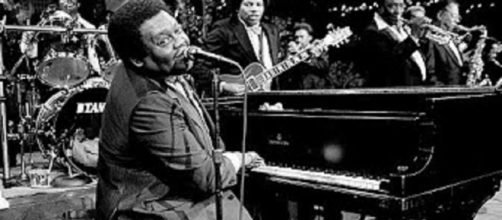The passing of Fats Domino on October 24 of natural causes in Harvey, Louisiana was lovingly commemorated as the kind of departure from this world that anyone would wish for, not complicated by machinery or medication, simply coming at age 89 as a cycle of life. No one can be sorry for this kind of death, nor the authentic kind of life that Fats Domino lived, whether surrounded by hometown folks or music royalty. He was a King who lived, loved, and talked like a common man, and liked the audiences to which he played, but his songs endure as rock 'n roll's regal lineage.
Music greats have never lost respect for the artistry of Fats Domino, but their fondest memories are of the man he was, and how he let his powerful, simple songs do all the boasting that the artist himself never did.
Giving piano its place
“I want to thank the man who proved that the piano was rock 'n roll instrument,” spoke Billy Joel to Fats Domino as the master of the ivories was among the first inductees in 1986. Contemporary, Little Richard reflected in Rolling Stone that Fats “could make a piano talk,” and even above Little Richard’s unmistakable falsetto, the sound of those keys was unmistakable.
It was more than his unique strike to make the strings of a piano resonate that made him memorable.
Bonnie Raitt cherishes “the way his accent crept into his words,” and remembers that “you couldn't not fall in love with him” just from seeing his photographs. His impact on music was ‘volcanic,’ but bragging was something he could never bring himself to do.
Little Richard shares fond memories of teaching Paul McCartney how to reach those high notes through their early days in Hamburg, Germany, yet Paul McCartney honors Fats Domino’s performance in 1956’s “The Girl Can't Help It” as “truly magnificent.” Paul later channeled the New Orleans inflection inspired by Fats on “Call Me Back Again,” from “Venus and Mars,” recorded in New Orleans.
McCartney recalls meeting Fats years ago in New Orleans, and marveling at his diamond encrusted, star-spangled watch as “our first introduction to bling.”
Rolling with life’s punches
The ostentation of that particular jeweled piece was reserved for stage presence. The artist enjoyed jewelry and nice cars through his heyday, yet luxury was not everyday life.
Even through the swing of his biggest hits, Domino did his own cooking from a hot plate and ate raw red beans and rice. Fats Domino suffered the same fate as most of his Lower 9th Ward neighbors amidst the disaster of Hurricane Katrina in 2005. He and his family were rescued from a roof. Nonetheless, Fats Domino remained philosophical, deeming the experience “Just one thing that happens, I guess.”
Fats Domino felt a calling to bring healing through music, and that compulsion, beyond necessity, brought a resurgence to work in 2006. The comfort of the artist who never resorted to “dirty lyrics” or “body movements” in songs got his city moving up in hope again. Once Fats and his family had a new home, he still would cook his red beans and rice in the bathroom, so he didn't leave a mess for his wife, Rosemary.
The recipe for his songs stayed simple and pure, too. New Orleans music legend Allen Toussaint declared that it was the dedication to “a simple pattern” in a Fats Domino song that kept it lasting. “If you liked the first two bars, you would like everything. He never fixed what wasn't broken,” insisted Toussaint. That formula was tested and true. Fats Domino never went genre-testing or took an "opener" band with him on the road. Seeing him stayed the same experience it was in 1955, and for lauded musicians like Robbie Robertson, “the sound, the groove, the power” echoed in his 14-year-old body, forever.
“Alive and Kickin’” was an album that rose out of hardship for Fats Domino, to great acclaim.
The 2006 release rings true to the legacy of the artist—as long as we live, we can sing and celebrate life. Fats Domino has gone to a better world, playing with the saints, but his timeless songs will keep making this world better.


